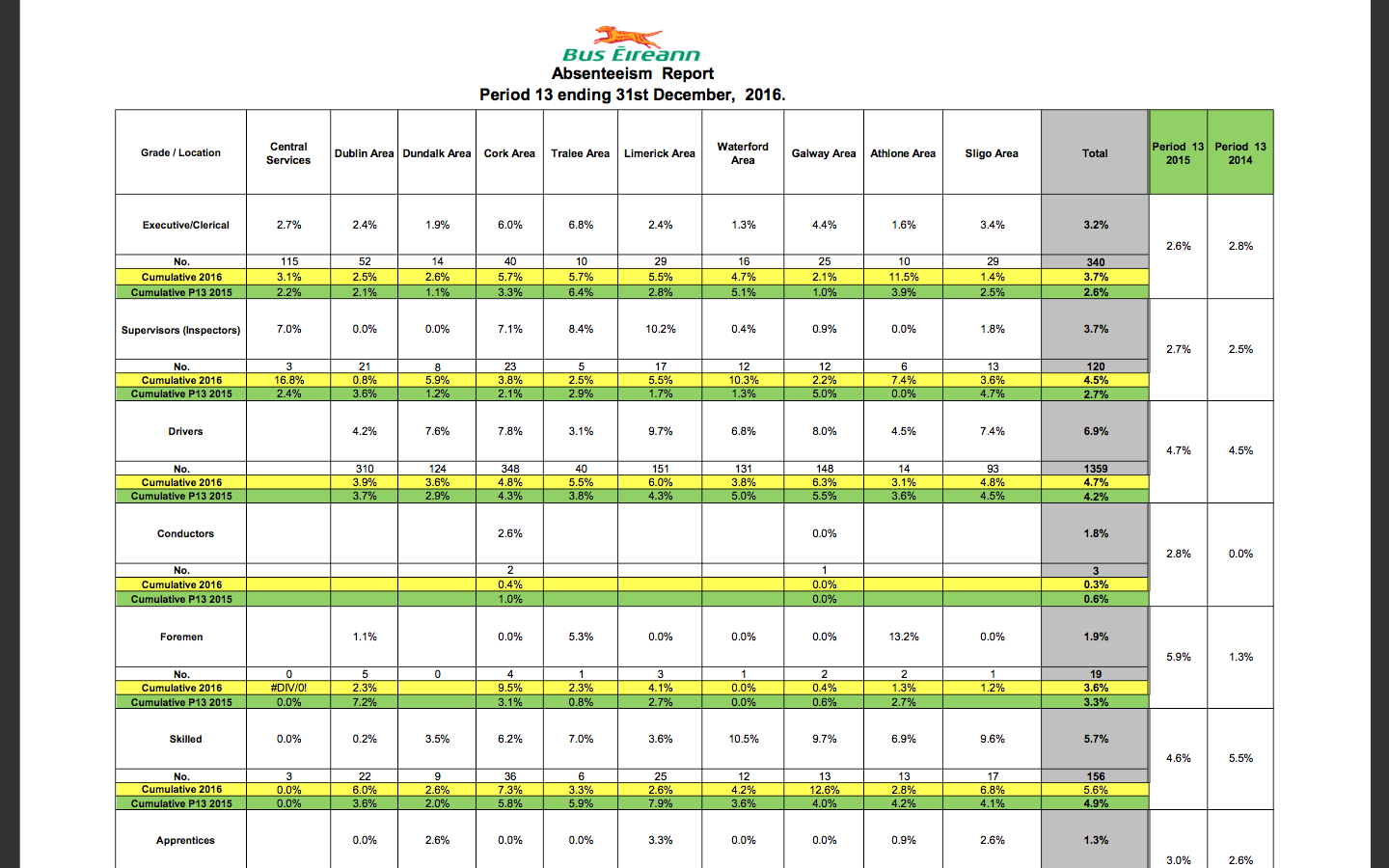By: Michael O’Farrell
Investigations Editor
BUS Éireann lost more than €3m last year as staff at the cash-strapped semi-State racked up an astonishing 24,600 days of sick leave, confidential figures reveal.
An internal report shows that, on average, employees at work in the company had an extra two weeks off in sick leave.
This will have cost the firm €3.5m, and it doesn’t include the productivity lost due to these absences.
These figures, which don’t include staff on long-term sick leave, indicate that, on average, 104 staff were out sick per day.
The troubled company’s chief executive Ray Hernan said this week that the absenteeism rate was 7%, but it is understood this figure includes those on long-term sick leave. The internal report confirms that when these employees are stripped away, on average, each of Bus Eireann’s 2,500 employees took 10 days – or two weeks worth – of sick leave in 2016.

An MoS calculation – based on these figures and a 236-day working year – suggests that, on average, on any one day, 104 Bus Éireann non-long-term sick employees are off. Based on the 7% total absenteeism rate, an average 174 employees are off.
This comes as the public service rate in general is dropping to an all-time low of 3.9% or 8.5 days per employee.
Recent Ibec research has shown that private sector absenteeism tends to range from between 2% and 3%, or an average of six days per employee per year.
Based on Bus Éireann’s average wage of €52,539, absenteeism costs the ailing company at least €3.5m, not counting the productivity losses as a result of these absences. The high absentee rates highlight the continued failure of Bus Éireann’s management to curtail spiralling costs – leaving the company in jeopardy of collapse within months.
Further confidential files seen by the MoS show how Bus Éireann’s management – led by just-departed chief executive Martin Nolan – drew up a set of urgent costcutting measures to stem rising losses in 2015, but then failed to implement them.
Now Mr Nolan and other managers, such as HR chief Joe Kenny, have left with secret payouts. The details of those payouts are confidential, Mr Hernan, who is an interim chief executive at the firm, told the Oireachtas Transport Committee this week.

These secret severance arrangements, and other escalating costs, have seen projected losses for last year rise by as much as €3m, to €9m.
Just a week ago losses for 2016 were projected to be €6m. The €9m operating loss is close to double the €4.8m target that was set for Mr Nolan in his confidential performance objectives scorecard for 2016 which has been seen by the MoS.
Further internal files, reports and plans reveal that cost-cutting plans cuts now include: Closure of a number of maintenance depots including Dundalk, Limerick, Cavan and Kells; Closure of School Transport offices in Dundalk and Athlone; Closure of travel centres/booking offices in many bus stations Introduction of premium fares on key Expressway services at weekends. The MoS also understands that loss-making Expressway routes to Galway, Limerick, Cork and Derry will be scrapped in coming weeks.
All of the above measures will see job losses or transfers.
But this crisis is not new. Mr Nolan’s 2016 performance targets, drawn up at the end of 2015, largely dealt with the necessity to cut costs by millions.
Had they been met, Bus Éireann may not have found itself battling for survival as it now does. Instead it appears a vital year has been lost, and that all sides – the then management, the Government and the unions, who have two directors on the board – intent on keeping their heads in the sand.
Bus Éireann plans to cut costs and stabilise the company in 2015 are contained in a confidential discussion paper that detailed the cost-cutting measures required to reduce losses immediately.
This plan initially contained 13 measures, such as cuts in overtime budgets, the cancellation of capital bus purchases to prevent a depreciation charge flowing into the 2016 accounts, the closure of travel and booking offices in many stations and premium fares on key Expressway services.
A value-for-money audit of training, to stop people ‘nominating themselves on to courses not relevant to their current job’ was also part of the plan. Of the 13 measures, ten – including all those mentioned above – appear to have never been implemented.
Instead, in January 2016 Bus Éireann reversed pay cuts agreed 18 months earlier despite some on the board arguing it would add €5m to pay costs.
Management then drew up plans that looked at the possibility of scrapping Bus Éireann’s loss making Expressway service altogether, meaning more than 500 redundancies.
Responding to queries on these issues, a spokeswoman said: ‘As stated at a Joint Oireachtas Committee earlier this week the absenteeism rate at Bus Eireann is approximately 7%. The acting CEO has identified this as a rate he believes must be improved through better management of processes.’
She said there were many corrective proposals drawn up over the last 24 months. She added that all structures – including regional and otherwise – are under review, but no decisions were finalised.
